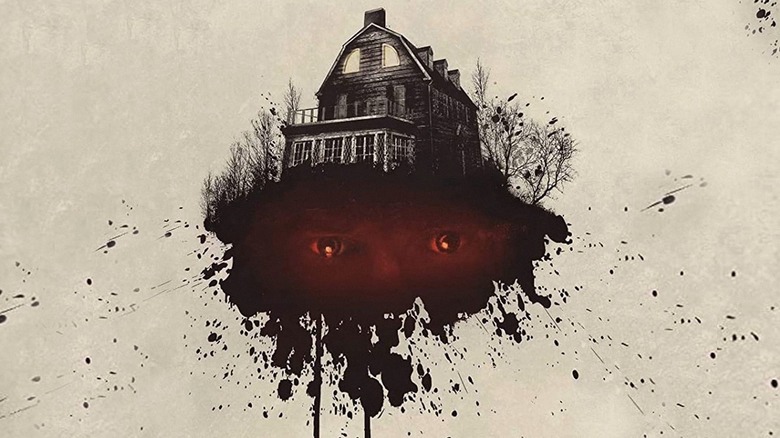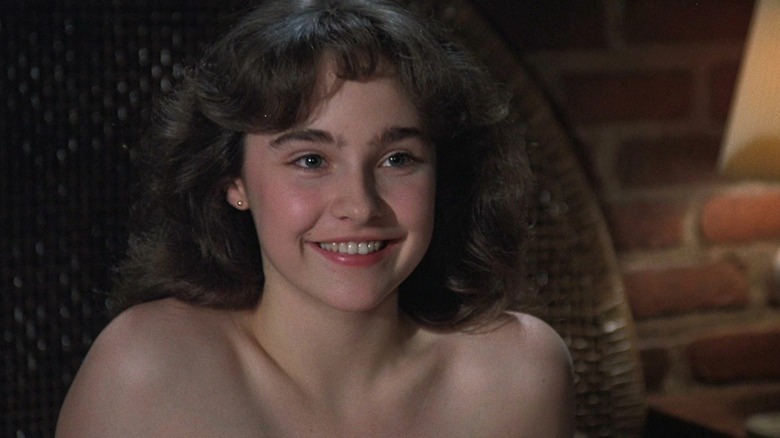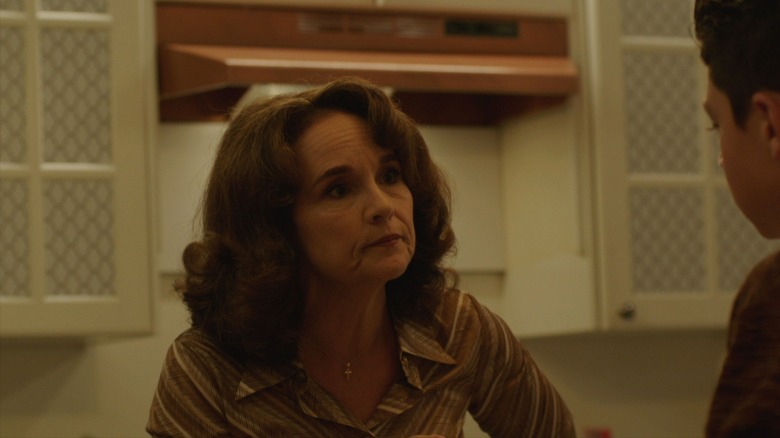The Amityville Murders Marked The Return Of An Old-School Franchise Star
Jay Anson's original non-fiction book "The Amityville Horror" was first published in 1977 and it quickly took the world by storm. "The Amity Horror" was based on the true crime story of Ronald DeFeo who, in November of 1973 (claiming to be under the influence of demons) prowled from room to room in his home at 112 Ocean Ave., and murdered six members of his own family. The eeriest thing about the slayings is that they were committed by shotgun, but no one seems to have left their beds, and the neighbors reported hearing nothing. After DeFeo had been apprehended and jailed, the Lutz family moved into the house. According to Anson's book, the Lutz family soon began experiencing a demonic presence as well, with George Lutz feeling that he was losing his consciousness to the influence of ... something evil. Flies attacked the house. When a priest was invited to purify the house, he reported wounds developing on his hands. After 28 days, the Lutzes were driven out.
It has since been revealed that the Lutzes were actively engaging in a hoax and were in collaboration with the imprisoned DeFeo, but that hasn't stopped the world from being increasingly interested in the Amityville story. The house at 112 Ocean has become a tourist attraction for horror hounds, and Anson's book has inspired at least 34 different feature films. The first film was Stuart Rosenberg's "The Amityville Horror" in 1979, followed by a flood of sequels, reboots, documentaries, and remakes, some of them high-end studio fare (the 2005 remake of "The Amityville Horror" with Ryan Reynolds), some of them crass underground shlock (2020's "Amityville Vibrator").
Of these many sequels, Damiano Damiani's 1982 film "Amityville II: The Possession" and Daniel Farrands' 2018 film "The Amityville Murders" used the true story of the DeFeo murders as their inspiration, looking past the Lutzes and their story. In both films, the DeFeo family is depicted as overbearing and abusive, with a stern father, a put-upon mother, and a sister who received the wrong kind of attention from Ron. Something else both films have in common? They both starred actress Diane Franklin.
Diane Franklin, 1982
"Amityville II: The Possession," based on Hans Holzner's 1979 follow-up book "Murder in Amityville," is a fictionalized account of the DeFeo murders, transforming Ronald and his family into the fictional Montelli family. Burt Young played the family's stern patriarch, Rutanya Alda played his wife, and Jack Magner played Sonny, the Ronald stand-in. "Amityville II: The Possession" was Diane Franklin's first feature film, having appeared in TV commercials and on soap operas as a teen. In it, she played Patricia Montelli, Sonny's younger sister. In a dark wrinkle (invented for the film), Patricia is seduced by her own brother while he under the influence of a demon that seems to reside in his new house's basement.
Franklin would go on to play notable roles in teen comedies and weirdo genre films throughout the 1980s, including "The Last American Virgin," "Better Off Dead," the amazing "TerrorVision," and "Bill & Ted's Excellent Adventure." Following that last film, however, Franklin seems to have semi-retired from acting, only occasionally appearing in single episodes of TV throughout the 1990s. Throughout the 2000s and 2010s, Franklin starred in numerous short films, only returning to the big screen in 2018 for "The Amityville Murders." In a recounting of the same material, but not actually using the DeFeo name, Franklin played Louise DeFeo, the mother of the family. This is, as Franklin herself pointed out in an interview with We Are Movie Geeks, the first time an actress has played two members of the same family in a sequel and a remake. The two films were made 35 years apart.
Diane Franklin, 2018
In the interview, Franklin talks about her different approaches to two related characters 35 years apart, and how much positivity or negativity the separate roles warranted:
"I am the only actress that has ever played the mother and the daughter in two versions of the same story so I get those two different perspectives. That was what was so amazing. When I got the role I wondered how I was so lucky to get this experience. When I played the daughter in 1982, I allowed myself to be completely innocent and not give off any negative energy. I wanted that character to be pure and upbeat and free.
"Amityville II: The Possession" rides the line between earnest horror exposé (along the lines of "The Exorcist") and lascivious grindhouse exploitation. "The Amityville Murders" possesses a harder edge, exploring the real-life suffering that the DeFeo family experienced. Franklin addressed that as well:
[W]hen I played the mother in the new film, I had to let that negative energy in and show that I know that there are problems and feel them. As a mother you know everything and you feel it the most, so it was a very different experience doing it this time. And I was more spooked this time that I was the first time.
We Are Movie Geeks also asked Franklin about the depiction of abuse and incest as they appeared in the two separate movies. She said:
I was curious about that as well. When I first read the script, I was wondering what director/writer Daniel Farrands was doing. I think he wanted to make more of a gentle reference to the incest instead of making it something that was the focus of the story. Everybody remembers the incest scene from "Amityville II," but the second film is more about the abuse and the family relationships. Because Daniel had made a documentary about Amityville, I think he wanted to stay true to the facts of what he knew. It was stated but never proven that there was an incestual relationship between these siblings, so it was really the directors call. I don't know if including an incest scene in the new one would've helped or hurt it. What I like about the new film it is based more on fact. This new one is more real to me.
The details of the DeFeo case remain familiar to horror fans everywhere, and the Amityville case will likely continue to inspire horror filmmakers for generations to come (the last two years alone have seen the release of eight Amityville movies).
Ronald DeFeo died in state custody in March of 2021. The cause of his death has not been disclosed. He was serving a sentence of 25 years to life in prison. He was 69.


